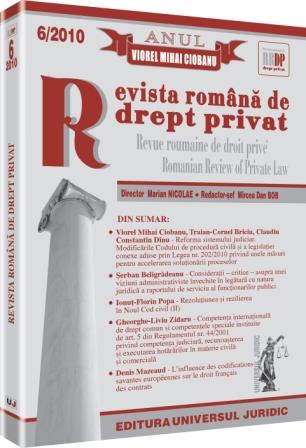Competenta internationalã de drept comun si competentele speciale instituite de art. 5 din regulamentul nr. 44/2001 privind competenþa judiciarã, recu
International common law jurisdiction and special jurisdiction established by art. 5 of regulation no. 44/2001 on jurisdiction and the recognition and
Author(s): Gheorghe Liviu ZidaruSubject(s): Law, Constitution, Jurisprudence
Published by: Universul Juridic
Keywords: international jurisdiction; common law; special jurisdiction; Regulation no. 44/2001
Summary/Abstract: Since Romania’s accession to the European Union, international jurisdiction in civil and commercial matters is governed (with few, although relevant exceptions) by Regulation no. 44/2001 on jurisdiction and the recognition and enforcement of judgments in civil and commercial matters (“Brussels I Regulation”), and not by Law no. 105/1992 on international private law relations. Brussels I Regulation is subsequent to the Brussels Convention on Jurisdiction and the Enforcement of Judgments in Civil and Commercial Matters, agreed in 1968 by the Member States of the European Economic Community by that time. Brussels Convention has set the challenging goal to create a uniform system of international jurisdiction in order to eliminate exorbitant jurisdiction under various national laws and to facilitate recognition and enforcement of judgments passed in Member States; this purpose is also defining for rules corresponding to Brussels I Regulation. Under a rich and sometimes complex case law, the Court of Justice of the European Union also set the priority for the implementation of the Brussels Convention provisions (and later, the Brussels I Regulation) in terms of legislation applicable to Member States, as well as the imperativeness for autonomous, uniform interpretation of rules of jurisdiction laid down by these deeds. Brussels I Regulation is, fundamentally, applicable where the defendant is domiciled in a Member State. There is no other general requirement for the application, although some rules imply via their very wording the existence of a foreign origin element (which may concern a non-member state, as well) and, as a rule, is irrespective of the state the applicant resides in. According to the Court of Justice, the rules of jurisdiction must be predictable and based on the principle actor sequitur forum rei, unless the nature of the dispute or the parties’ will warrant another solution. International common law jurisdiction is governed by Art. 2 which establishes, therefore, the traditional rule actor sequitur forum rei. The Regulation also establishes special jurisdiction, considering the nature of the dispute and its connection to a place situated in another Member State than where the defendant resides, or in consideration of one party’s quality. As regards special jurisdiction, the study hereby aims to approach the rules provided for in Art. 5 of Brussels I Regulation, the most important in practice – and, concurrently, those configuring a significant case law – being special jurisdictions in tort and contract claims. As it shall be attested hereinafter, special jurisdiction rules determine not only the international jurisdiction of courts of a particular state, but even govern territorial jurisdiction, thoroughly ruling out national law in the matter. As we assume, all these issues stand for a reason enough to approach more carefully this very important statutory document for civil lawsuits within the
Journal: Revista Română de Drept Privat
- Issue Year: 2010
- Issue No: 06
- Page Range: 118-190
- Page Count: 73
- Language: Romanian
- Content File-PDF

